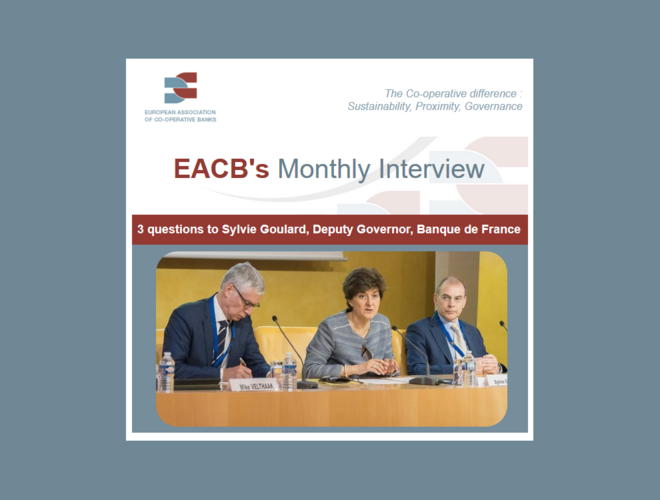3 questions to Sylvie Goulard, Deputy Governor, Banque de France
1. You made the keynote address to the Workshop on Sustainable Finance organised by the EACB in Paris, could you please tell us why sustainability considerations are becoming so important from a supervisory point of view?
Climate change will affect the global economy and the financial system that supports it. The financial risks at stake are in consequence system-wide and potentially irreversible if not addressed. Exact pathways may be uncertain but it is foreseeable that financial risks will crystallize in some form through either the physical or transition channel, or some combination of them both. And while the financial risks may be realized over an extended time horizon, the risks call for action in the short-term to reduce impact in the long-term.
The Network of central banks and supervisors for Greening the Financial System (NGFS), launched in December 2017 at the One Planet Summit unanimously acknowledged that “climate-related risks are a source of financial risks. It is therefore within the mandates of Central Banks and Supervisors to ensure the financial system is resilient to these risks.”
Authorities and financial institutions need to develop some new analytical and supervisory approaches, including those based on forward looking scenario analysis and stress tests. Action is required now to reduce future financial risk although historical data is not sufficient to estimate this impact. The nature of the risk factors requires an enhanced approach, one that is forward looking and takes a long-term perspective.
2. What is the role of NGFS and Banque de France in that context?
Central banks cannot be a substitute for policy makers but they can help and are determined to help. International cooperation is utmost necessary to meet the global challenges we are facing. The NGFS, chaired by Frank Elderson from the DNB and whose secretariat is provided by the Banque de France, is now represented on the five continents. NGFS members’ jurisdictions cover 44% of global GDP and 45% of greenhouse gas emissions. We collectively supervise two-thirds of systemic financial institutions, banks and insurers alike. What appears obvious to most of us today was not previously set in stone.
In April 2019 the NGFS published its first comprehensive report “A call for action”. The report includes four recommendations for central banks and supervisors and two recommendations for policy-makers. The first four recommendations identify areas where central banks and supervisors can do more and better:
Integrating climate-related risks into financial stability monitoring and micro-supervision.
- 1. Integrating sustainability factors into own-portfolio management.
- 2. Bridging the data gaps.
- 3. Building awareness and intellectual capacity and encouraging technical assistance and knowledge sharing.
The two last recommendations are aimed at policy makers at large and flag some areas where they could support the efforts of the supervisory community:
- 1. Achieving a robust and internationally consistent climate-and environment-related disclosure.
- 2. Supporting the development of a taxonomy of economic activities.
Going forward the NGFS will focus on a number of technical and concrete deliverables to move from principles to operational processes.
On the investment side, in 2018, the Banque de France adopted its Responsible Investment Charter, reflecting the Banque’s aim to lead by example in the inclusion of CSR – economic, social and environmental – applied to its role of institutional investor.
Its first Responsible Investment Report in compliance with the Responsible Investment Charter was published in 2019. The Banque de France has chosen three pillars and five objectives to operationalize its responsible investment charter:
- 1. The first pillar for the Banque de France involves aligning its investment strategy with France’s climate commitments, i.e. achieving carbon neutrality by 2050.
- 2. The third pillar for the Banque de France is exercising its right to vote to encourage greater consideration of Environmental, Social and Governance issues by companies.
- 3. The second pillar involves including ESG criteria in asset management, i.e. selecting issuers based on their Environmental, Social and Governance performance.
From a supervisory perspective, the French supervisor (ACPR) published in April 2019 two reports analyzing how the French banks and insurers respectively take into account and manage climate change risks.
Among the sample of nine banks analyzed by the French regulator are also three members of the EACB: Crédit Agricole, BPCE and Crédit Mutuel. Two aspects were examined in particular: 1) How management is organised within banking institutions to face climate change-related risks. ; and 2) The in-house exposure assessment of institutions to climate-related risks and how they measure them.
3. How do you see the role of the banking sector and more specifically of co-operative banks regarding sustainability?
The banking sector in general and co-operative banks in particular have a key role to play to measure and mitigate their exposures to climate risks, and as a flipside to the same coin, mobilize capital flow to finance the transition to a sustainable economy. Ultimately, climate risks should be appropriately reflected within the pricing of financial assets and embedded within the risk governance of each financial institution.
The conclusions of the two recent ACPR reports made clear that, there is significant progress in the governance of climate change risks: some modest progress in the apprehension of physical risks and significant progress in analyzing transition risks.
These assessments confirm the relevance to continue the ACPR’s analytical and supervisory work so that the financial sector further takes into account these risks and call for a continued commitment of the banking sector at large. The support of the EACB is very welcome in that regard.
Visit the post-event webpage



